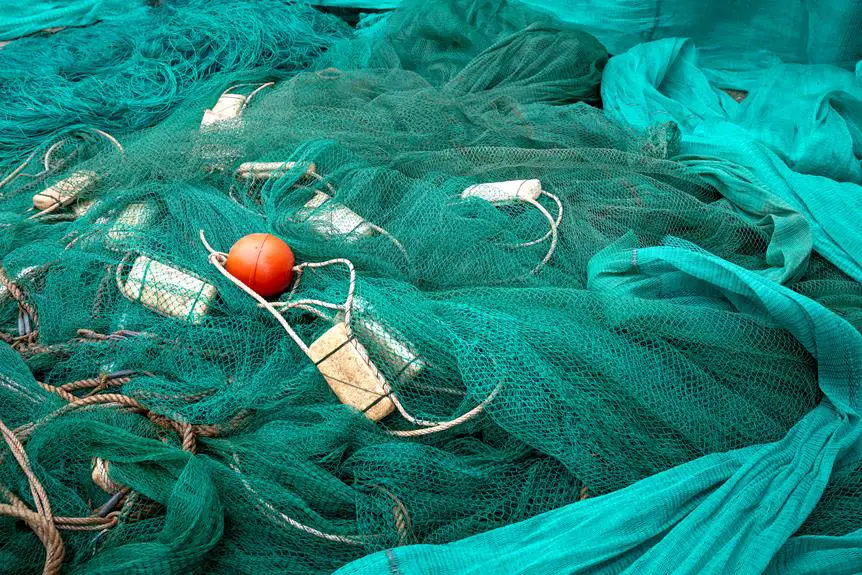Looking to secure plastic? Did you know that using the right fabric can make all the difference?
Different fabrics offer varying levels of strength, durability, and weather resistance, so choosing the best one is crucial for securing your plastic effectively.
In this guide, you'll discover the top fabric options for tying down plastic, including nylon, polypropylene, polyester, cotton, paracord, bungee cord, ratchet straps, and webbing. Each fabric brings its own unique characteristics, so you can select the best option based on your specific needs.
Whether you're securing a tarp, covering outdoor furniture, or transporting goods, mastering the art of tying down plastic with the right fabric will ensure a secure and reliable hold.
Key Takeaways
- Nylon and polyester are strong and durable options for tying down plastic, as they have exceptional strength, high tensile strength, and resistance to abrasion.
- Polypropylene is a lightweight and weather-resistant option, as it floats in water, is highly resistant to moisture and UV radiation, and maintains strength in various environmental conditions.
- Cotton is a natural and versatile option for tying down plastic, as it is durable, resistant to tearing and fraying, and suitable for securing lightweight and heavier materials.
- Paracord is a tough and multi-purpose option, as it offers exceptional strength and durability, versatility in tying down plastic in different situations, and impressive load-bearing capabilities.
Nylon: A Strong and Durable Option
If you need a strong and durable fabric for tying down plastic, consider using nylon. Nylon is renowned for its exceptional strength and durability, making it an excellent choice for securing plastic materials. Its high tensile strength and resistance to abrasion make it ideal for withstanding the rigors of tying down heavy or bulky plastic items. Nylon is also known for its ability to maintain its strength when wet, which is crucial for outdoor applications where exposure to moisture is a concern. Additionally, nylon's elasticity allows it to absorb shock loads, reducing the risk of damage to the plastic items being secured.
When it comes to durability, nylon is a top contender. Its resilience to wear and tear ensures that it can withstand repeated use without compromising its performance. This longevity makes nylon a cost-effective option for long-term tie-down needs, as it can endure harsh conditions and maintain its integrity over time.
As a result, choosing nylon as a tying down fabric provides a reliable and durable solution for securing plastic items, offering peace of mind and confidence in its ability to withstand demanding applications.
Polypropylene: Lightweight and Weather-Resistant
Polypropylene offers a lightweight and weather-resistant option for tying down plastic. When compared to nylon, polypropylene has its own strengths and weaknesses. While nylon is generally stronger and more resistant to abrasion, polypropylene is lighter and floats in water, making it an excellent choice for marine applications.
In terms of weather resistance, polypropylene outperforms nylon. It's highly resistant to moisture, mildew, and UV radiation, making it ideal for outdoor use in different climates.
In various weather conditions, polypropylene demonstrates superior performance compared to nylon. In hot and humid climates, polypropylene maintains its strength and doesn't absorb moisture, whereas nylon may weaken when exposed to high humidity. In cold climates, polypropylene remains flexible and doesn't become brittle, while nylon can become stiff and prone to cracking.
This makes polypropylene a reliable choice for tying down plastic in a wide range of environmental conditions. In summary, polypropylene's lightweight nature and exceptional weather resistance make it a preferred choice for tying down plastic in various climates, offering strength and durability without compromising on performance.
Polyester: Resilient and UV-Resistant
When tying down plastic, you can also consider polyester, which is known for its resilience and UV resistance, providing another option for securing your materials in various environmental conditions. Polyester is a popular choice for outdoor applications due to its durability and ability to withstand harsh weather conditions. Its resistance to UV rays makes it suitable for prolonged outdoor use, ensuring that your tied-down plastic remains secure and protected from the sun's damaging effects.
| Advantages of Polyester for Tying Down Plastic | Description |
|---|---|
| Resilient | Polyester is a strong and durable material, making it ideal for securing plastic in outdoor environments. |
| UV-Resistant | The UV resistance of polyester ensures that it can withstand prolonged exposure to sunlight without degrading. |
| Versatile | Polyester can be used in a wide range of outdoor applications, providing flexibility for tying down plastic in different settings. |
| Weather-Resistant | It is resistant to moisture and can maintain its strength and integrity in various weather conditions. |
Polyester's qualities make it an excellent choice for tying down plastic in outdoor settings, offering resilience and UV protection to ensure the security of your materials.
Cotton: Natural and Versatile
When securing plastic, you should consider using cotton, a natural and versatile fabric that offers flexibility and strength for tying down materials in various applications.
Cotton possesses natural durability, making it an excellent choice for securing plastic due to its ability to withstand outdoor elements and resist tearing or fraying. Its natural resistance to tearing and fraying ensures reliable and long-lasting hold, even in challenging weather conditions.
Furthermore, its versatility allows for a wide range of uses, from securing lightweight plastic sheeting to anchoring heavier materials. Cotton's versatility extends to a multitude of applications, including securing plastic covers on construction sites, tying down protective tarpaulins during transportation, and fastening temporary enclosures.
Its adaptability makes it a go-to option for various tying down needs, providing a secure hold without causing damage to the plastic material.
Consider cotton as your fabric of choice when tying down plastic, as its natural durability and versatile uses make it an indispensable option for securing materials in diverse settings.
Paracord: Tough and Multi-Purpose
Paracord is an excellent choice for tying down plastic due to its exceptional strength and durability.
Whether you're securing a tarp or building a makeshift shelter in the outdoors, paracord's versatility makes it an invaluable tool.
Its ability to withstand various conditions and hold up under pressure makes it a reliable option for any tying down needs.
Paracord's Strength for Tying
To ensure a secure hold for tying down plastic, you'll find that paracord's strength and versatility make it an excellent choice.
When it comes to knot tying techniques, paracord offers a wide range of options, including the versatile and secure square knot and the reliable and easy-to-untie bowline knot.
These techniques provide the flexibility needed to secure plastic in various situations.
Additionally, paracord's load bearing capabilities are impressive, with the cord's ability to withstand significant weight making it a reliable choice for tying down plastic.
Whether you need to secure plastic sheeting for a temporary shelter or fasten a tarp over equipment, paracord's strength and load bearing capabilities make it a go-to option for ensuring a tight and secure hold.
Versatile Uses in Outdoors
For outdoor activities, a few feet of paracord can serve as a tough and multi-purpose tool to meet various tying and securing needs. Whether you're setting up a tent, repairing outdoor gear, or creating a makeshift clothesline, paracord is an essential item for outdoor enthusiasts. Its strength and durability make it a reliable option for camping essentials and outdoor gear maintenance. Take a look at some versatile uses of paracord in the outdoors:
| Versatile Uses of Paracord | Benefits |
|---|---|
| Tent guy lines | Provides secure anchoring |
| Equipment repairs | Durable and dependable |
| Clothesline | Strong and lightweight |
| Tarp tie-downs | Versatile and multi-purpose |
Durability in Various Conditions
When tying down plastic, you need a fabric that can withstand various conditions and provide reliable strength and versatility. Paracord is renowned for its exceptional fabric strength, making it a top choice for tying down plastic in diverse outdoor settings.
Its durable nylon construction ensures that it can handle substantial tension without fraying or breaking, offering the reliability needed for securing plastic effectively. Additionally, paracord boasts impressive weather resistance, remaining resilient in the face of moisture, UV exposure, and extreme temperatures.
This means you can trust it to maintain its strength and integrity, whether you're securing plastic covers during a rainstorm or in scorching heat. With paracord, you can have confidence in its ability to endure and provide the steadfast support necessary for tying down plastic in various conditions.
Bungee Cord: Elastic and Secure
You can rely on a bungee cord for its elastic and secure properties when tying down plastic. The elasticity benefits of a bungee cord allow it to stretch and adapt to the specific contours of the plastic, ensuring a snug and secure fit. This flexibility is particularly advantageous when securing irregularly shaped or oversized plastic items, as the bungee cord can adjust to accommodate various dimensions without sacrificing its tensile strength.
When employing a bungee cord, it's crucial to utilize secure fastening techniques to maximize its effectiveness. Double-looping the cord and ensuring a tight, firm grip around the plastic will prevent slippage or loosening during transportation or exposure to external forces. Additionally, using multiple bungee cords in conjunction can distribute the tension evenly, minimizing the risk of strain on individual attachment points.
Ratchet Straps: Heavy-Duty and Adjustable
Ratchet straps offer heavy-duty and adjustable solutions for securing plastic materials. Understanding the benefits and proper use of ratchet straps is crucial to ensuring a secure tie-down.
Let's explore the advantages and best practices for using ratchet straps effectively.
Ratchet Strap Benefits
For securing plastic, relying on ratchet straps is both heavy-duty and adjustable, making them a dependable choice. When it comes to ratchet strap benefits, here are a few points to consider:
- Ratchet Strap Maintenance:
- Regularly inspect straps for wear and tear, ensuring they're in optimal condition for securing heavy loads.
- Clean straps after each use to prevent dirt and debris from compromising their effectiveness.
- Ratchet Strap Alternatives:
- Explore different types of straps and tie-down methods for tying down objects, depending on the specific needs of your cargo.
- Consider alternatives such as cam buckle straps or bungee cords for lighter loads or where ratchet straps may be less suitable.
Ratchet straps offer the versatility and strength needed to secure plastic and a wide range of other items, making them a valuable tool for any tying-down application.
Proper Ratchet Strap Use
When securing plastic, it's essential to properly utilize ratchet straps to ensure heavy-duty and adjustable fastening. Regular maintenance and proper use of ratchet straps are crucial for securing plastic and other heavy loads effectively.
To ensure ratchet strap safety and proper usage, always inspect the straps for any signs of wear and tear before each use.
Follow load securing techniques and best practices by placing the plastic or heavy load evenly on the surface and tightening the straps securely. Avoid overloading the ratchet straps beyond their capacity and always use the appropriate strap for the specific weight and size of the load.
Additionally, make sure to fasten the ratchet straps according to the manufacturer's instructions to achieve the most secure and reliable fastening.
Webbing: Sturdy and Easy to Handle
You'll find webbing to be a sturdy and easy-to-handle material for tying down plastic. It offers the strength needed to secure plastic coverings while also being manageable to work with. Here are some reasons why webbing is an excellent choice for tying down plastic:
- Durability: Webbing is crafted to withstand heavy loads, making it reliable for securing plastic in various weather conditions.
- Stitching Techniques: The woven construction of webbing ensures that it can endure tension without fraying or breaking, providing a secure hold for your plastic coverings.
- Ease of Use: Unlike ropes, webbing is flat and smooth, making it easier to handle and tie knots.
- Knot Tying Methods: With webbing, you can easily learn and master different knot tying methods to secure your plastic covers effectively.
Frequently Asked Questions
Can I Use These Fabrics for Tying Down Heavier Objects, Like Furniture or Appliances?
You can use these fabrics for tying down heavier objects, like furniture or appliances. Their durability and strength make them suitable for alternative uses beyond just tying down plastic.
Are There Any Specific Knots or Tying Techniques That Work Best With Each Type of Fabric?
For different knot styles, consider the strength of the fabric. Even with resistance to wear, durability in outdoor conditions varies. Experiment with various techniques to find the most secure and reliable option for your needs.
Can These Fabrics Withstand Extreme Weather Conditions, Such as High Winds or Heavy Rain?
You need to consider fabric durability and weather resistance when tying down plastic. Choose a strong fabric and use reliable tying techniques for knot strength, especially in extreme weather conditions like high winds or heavy rain.
Are There Any Safety Precautions or Best Practices to Keep in Mind When Using These Fabrics for Tying Down Plastic?
When using these fabrics for tying down plastic, remember safety precautions and proper usage. It's essential to follow best practices and ensure material durability. Keep in mind the potential risks and the need for secure fastening.
Can These Fabrics Be Easily Cut or Damaged, and if So, How Can I Prevent That From Happening?
To prevent damage and ensure secure knots when tying down plastic, consider the fabric's strength and weather resistance. Ensure it's not easily cut or damaged by choosing a durable material and tying knots securely.
- Does Linen Keep You Cool at Night? - April 9, 2024
- Is Linen Cool for Sleeping? - April 9, 2024
- Is Linen Sun Proof? - April 9, 2024







